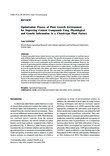Optimization Process of Plant Growth Environment for Improving Content Compounds Using Physiological and Genetic Information in a Closed-type Plant Factory
JARQ : Japan Agricultural Research Quarterly
| ISSN | 00213551 |
|---|---|
| 書誌レコードID(総合目録DB) | AA0068709X |

本文フルテキスト
jarq55-3_201-208.pdf1.12 MB
A closed-type plant factory (plant factory) can control growth environments in confined spaces with artificial lights and hydroponic systems. The growth environment of a plant factory can be modulated without having to consider the natural climate, so that high value plants rich in useful compounds or low in toxic compounds can be uniformly and consistently produced. However, the process of optimizing growth condition settings to increase or decrease the target compounds tends to be complicated, given the various control parameters in a plant factory. An efficient optimization process for producing high value plants was shown using physiological and genetic information in the case of Stevia rebaudiana (stevia). This case study was conducted to determine the optimal conditions for producing stevia rich in sweet steviol glycosides (SGs) compounds. All environmental condition settings were selected based on previous studies relating to the biosynthesis of such SGs as stevioside (Stev) or rebaudioside-A (Reb-A). A yield evaluation of Stev and Reb-A was conducted based on the transcription levels of SGs-related genes. The process of producing SGs-rich stevia provides an example of an efficient optimization process for producing high value plants with increased or decreased target compounds in a plant factory system.
| 刊行年月日 | |
|---|---|
| 作成者 | Yuki YONEDA |
| 著者キーワード | control light environment high value plants stevia sweetening |
| 公開者 | Japan International Research Center for Agricultural Sciences |
| 受付日 | 2020-05-11 |
| 受理日 | 2020-11-03 |
| 巻 | 55 |
| 号 | 3 |
| 開始ページ | 201 |
| 終了ページ | 208 |
| DOI | https://doi.org/10.6090/jarq.55.201 |
| 言語 | eng |
